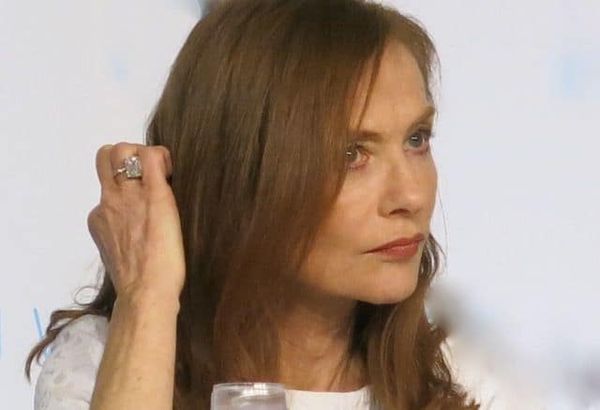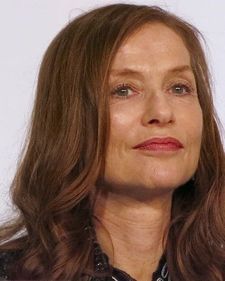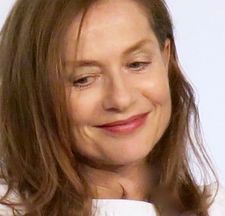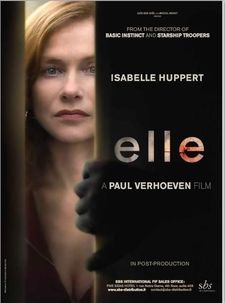 |
| On image: "People’s perception of you is strange and makes me laugh. I think it is associated with the roles you do …” Photo: Richard Mowe |
As one of France’s most revered and prolific actresses, Isabelle Huppert never seems to stop working. Last year, at 62, she was in Cannes with two films - French director Guillaume Nicloux’s Valley Of Love (released on DVD and Blu Ray release next month) and Norwegian Joachim Trier’s Back Home (also known as Louder Than Bombs), both made in English. Nicloux’s film reunited her with Gérard Depardieu after almost two decades as parents mourning the death of a son while in Trier’s film it is about how her husband (Gabriel Byrne) and two sons cope with her death as a war photographer. She will appear with her Amour co-star Jean-Louis Trintignant in the new Michael Haneke project about Calais migrants. She has one film slated for the Berlin Film Festival - Mia Hansen-Love’s Things To Come (L’Avenir) in she which plays a philosophy teacher. The Cannes Film Festival may beckon to Paul Verhoeven’s Elle in which she plays a woman trying to find out the identity of her rapist. Meanwhile she is preparing to return to the London stage in June as Phaedra, embodying one of Greek mythology’s most enigmatic characters, although the classic has been relocated to a contemporary setting.
 |
| On roles: "I am more attracted to directors than the character - I am always more interested in the vision of someone else.” - Isabelle Huppert Photo: Richard Mowe |
RM: Have the dynamics of acting with Gérard Depardieu changed over the years?
IH: No we like to act together. I cannot imagine anyone not wanting to act with him because he makes it very easy. It is difficult for me to describe it, but there is a chemistry and a sense of intimacy. It was a wonderful reunion with him on Valley of Love after 35 years, and now we are doing another film together. It is very uncomplicated to work together. We never talk about it, we just do it. We are not friends exactly but I think we love each other.
RM: Are your styles of acting very different or do they coincide?
IH: Our approaches are similar. We are both instinctive. We never rehearse. In French films we do not rehearse a lot - that is more an American thing. I am not saying on way is better than the other. When I worked on Amateur in the States with Hal Hartley we did rehearse quite a lot before the shoot. This is very American - if you talked about rehearsal with Michael Haneke or the late Claude Chabrol they would laugh. We do not even read with Michel - we just do it. We do not analyse the situations we just do it. May be we are just lazy! [She laughs.] Every situation is different, of course. I have just finished this film with Mia Hansen-Love called L’Avenir / Things To Come which will be in the Berlin Film Festival next month and Mia was very directorial. I loved that. You cannot say one way is better than the other: each method is valid and it comes out of necessity.
RM: After more than 100 films and having worked with so many directors is there anyone with whom you might still want to collaborate?
IH: I am not in to this kind of thing but if there is one it would be Woody Allen because I think we could do good work together.
RM: In theatre is the rehearsal process part of the craft that you enjoy?
 |
| On career: "Even when I work a lot I never feel over-stretched. Working is a natural state for me … “ Photo: Richard Mowe |
IH: Doing a stage production, of course, it is impossible not to rehearse. In France we rehearse for a lot longer than anywhere else including the UK and Australia where I performed in Jean Genet’s The Maids with Cate Blanchett. In the subsidised theatre we rehearse a lot - for Phaedra which will be on at the Barbican in London in June we will rehearse eight or nine weeks. The director is Krzysztof Warlikowski, head of Warsaw’s Nowy Teatr. I haven’t been on stage in London for 20 years - the last time was as Mary Stuart at the National Theatre. I am looking forward to going back. I will be doing it in French because the English can be so mean when it comes to accents.
RM:Are you attracted to certain kinds of characters?
IH: Actually I am more attracted to directors than the character - I am always more interested in the vision of someone else. And I am intrigued by those who are more unusual and original.
So what was the appeal of working with the Dutch director Paul Verhoeven on Elle, his first film in French and marking a return after a ten year absence?
IH: He is a great director. One of the first films I saw as a young person was Turkish Delight from his Dutch period and I loved that film and still do. Eventually I saw all his films so he is someone who is very worthwhile. And the role itself is a tough one for sure as a woman who tries to find out the identity of her rapist. [Verhoeven is quoted as having nothing but praise for Huppert: “She is an extremely gifted actress that gives you more than what’s on paper… She does experiments in her mind to get to places that she would probably avoid in reality. And she does that in an absolutely unique way.”]
RM: Are there any of your films with which you are particularly pleased?
 |
| Huppert on the poster for Paul Verhoeven’s Elle |
IH: I am proud of all the films I have done although there are some that stand out more than others including all the films I did with Chabrol and Haneke’s films but I would not leave any of them on the side. The variety of the work I have done from so many countries and directors is what I like about it, and cinema has given me the possibility to do that.
RM: What makes you accept a script in the first place?
IH: Many different things of course - the director’s persona is an important factor. Some times you have scripts that don’t measure up on paper but a loose script can still leave open all the potential. Making choices is difficult. As far as comedies and dramas go I have never really established a border between the two - even in Haneke films can be very funny and believe the next one is going to be funny even though you won’t be able to call it a comedy. It is the same in literature - a great book is dramatic but should be funny too like in Gustav Flaubert.
RM: Do you have any space left in your agenda for a home life because you seem to work all the time and almost non-stop?
IH: Even when I work a lot I never feel over-stretched. Working is a natural state for me and I never feel I am ground down by my work load. Raising a family in these circumstances was no more difficult than for most people and I am in a pretty privileged position.
RM: Some people think you might be a bit austere in person - can you see that quality in yourself.
IH: People’s perception of you is strange and makes me laugh. I think it is associated with the roles you do - and the image of an actress is such a complicated construction.
Valley Of Love will be out on DVD and Bluray in February and Back Home will be released later in the year. Back Home (original title Louder Than Bombs) is to be released in cinemas in March in the US and April in the UK. Phaedra is on at the Barbican, London, from 16 June. Elle is scheduled for a French release in September.





















